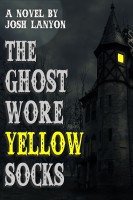The Brief History of the Dead - Brockmeier Kevin (книги бесплатно без регистрации TXT) 📗
A banner was flapping between two flagpoles on the side of a building, tightening and relaxing like a sail luffing in a gentle breeze, but on the pavement everything was perfectly still. Luka kept his eyes open for any sign of human activity. He matched his step to Minny's. The blind man stayed a few paces ahead of them, running his hand along the walls and the windows, never stumbling as he stepped over the curb into the intersections of the empty streets.
Luka planned to lead them back to his office before the day was out. He was afraid he had neglected to close his window. Whether or not they found anybody, he didn't want to leave his equipment exposed to the rain. The mimeograph machine, in particular, barely worked on even the best of days: the crank often got stuck, or the drum fell loose, or the paper came through clotted with ink. He hated to imagine how it would operate with a few gallons of rainwater irrigating the machinery.
They stopped for a few minutes at a small, enclosed park on the corner of Seventeenth and Margaret Streets, where they lined up on one of the wrought-iron benches to rest their legs. Minny took her shoes off and began rubbing the soles of her feet, massaging them with her thumbs and then with her knuckles. "This is what a lifetime of driving from the door to the mailbox will get you," she complained. "Little-girl feet."
A pair of basketballs had drifted to a stop against the chain-link fence. Every so often a gust of wind would pass between them, and they would roll apart and come back together again with an oddly resonant thumping noise. Minny slipped her shoes back on, Luka tapped the blind man's shoulder, and the three of them headed back out toward the conservatory.
It was still early in the day when the blind man brought them up short, extending his left arm. "Did you hear that?" he asked.
Luka hadn't noticed anything. Neither had Minny.
"It sounded like a gunshot," the blind man said. "A few miles away."
He cocked his head and pointed. "There! There it was again!"
All at once, and without another word, he struck off at a fast walk. Luka and Minny had no choice but to follow after him. He appeared to know exactly where he was going. He made a right onto Third Avenue, sheering around a car that was tilted up onto the sidewalk, then took a left by the Ginza Street Shopping Mall. He never turned down a blind alley or into a courtyard, never even paused. Luka couldn't figure out how he did it. Maybe it had something to do with the shape of the wind, the way various sounds came together or frayed apart in his ears. Or maybe it was his sense of equilibrium, which must have been as finely calibrated as a compass. Luka made a note to ask him whenever they got where they were going.
The blind man took them past a library and a gymnasium – four blocks, eight blocks, ten – leading them swiftly toward the river and the monument district. By the time the next gunshot was fired, the sound was much clearer. "Damned if I can't hear it," Luka said.
"It's a signal." The blind man scraped past a wooden barrel and let out a huff. "Someone's trying to get our attention."
"Why didn't we think of that?" Luka asked.
"We did," the blind man said. "But I didn't imagine either of you were likely to have a gun."
It was two more blocks before they broke out from behind the mass of buildings. They rounded the concrete wall of a parking garage, took a few steps up a wheelchair ramp, and saw stretched out before them the broad, grassy clearing at the center of the monument district. A spokelike pattern of walkways radiated from the monument, which was a polished marble obelisk supported on a narrow pedestal. A man with a pistol was standing beside it firing into the air.
And milling all around him, their voices raised in conversation, must have been two hundred people. A half dozen others were trickling in from the other side of the field, converging at the sound of the gunshot.
Minny gasped and took a step back, knocking heavily into Luka. "I'm sorry," she began. "It's just… it's just that," and she swallowed and slowly shook her head. "It's just that I never thought I would see so many people again."
"It's a big city," Luka said, by which he meant to say, Neither did I. And without thinking, he took her hand and pressed it to his chest. Then they followed the blind man out of the shadows and into the body of the crowd.
FOUR. THE MILES
The first two days of the journey went by without trouble. From her seat in the sledge, Laura followed a steady course to the northwest, using the GPS system and the onboard navigational equipment to plot her course to the station. She had never driven a sledge before, but the controls were surprisingly easy to operate. The weather was clear and there was a glasslike transparency to the air, so that she rarely had to stop for more than a few minutes at a time. The runners beneath the sledge, heated to diminish the abrasion of the ice, were capable of carrying her over all but the largest gaps and fissures, and the only time she had to vary her path was when a shoulder of rock or ice lanced its way up through the ground and forced her to circle around to the other side. She drove through the long daybreak of the Antarctic fall, resting only when the sun was high enough to rise up off the ice in a disorienting glare. Then she continued driving until the day was over and the evening was snuffed from the sky.
At sunset, when she stopped to rest, she had to unpack her equipment. The tent was easy to assemble. It was ornamented with a pull cord that caused it to pop from its bag and stretch out like a life raft until it fully expanded. She would walk around the edges knocking stakes into the ground, and then, when the wires were secure, she would carry her sleeping bag and cooking gear inside and bed down for the night. That was it; the whole procedure took less than fifteen minutes. In the morning, when she was ready to leave, all she had to do was tug on the pull cord again to make the tent collapse in on itself, withering into a perfect little cylinder that made a hissing noise as it shrank. A tag above the entrance read, WARNING: ALWAYS LEAVE DOOR OPEN WHEN DEFLATING TENT, and every time she saw it, she imagined the thing exploding like a balloon as it tightened around its bubble of trapped air, drifting to the ice in a thousand tatters of pink cloth. It was the kind of tent that was purchased by wealthy corporate executives who intended to hike the Rockies or the Appalachians someday but never quite managed to leave the city. Eventually, their children would set it up in the middle of the living room, between the sofa and the fireplace, and pretend they were pioneers. And who's to say they weren't?
Ever since she was a little girl, Laura had felt like a pioneer, passing over into the wilderness of the rest of her life. She remembered lying beneath her bed on her twelfth birthday, staring up into the orchardlike rows of the box springs and thinking how strange it was that she had no idea where she would be a year later, on the day she turned thirteen, and that she had had no idea where she would be today the year before, on the day she turned eleven. Certainly she could never have guessed that she would find herself lying underneath her bed staring at the box springs and wondering about the way time was put together. Why was it that everything that had happened to her in the past seemed so clear, but as soon as she turned toward the future, it all went dim and faded to nothing? Was that what it meant to be alive – moving from a brightly lit corridor into a darkened room at every step? Sometimes she felt that way.
The tent kept her warm at night, or as warm as she could reasonably expect to be. She found the hum of its soft coil oddly comforting, like the sound of car wheels hissing over wet asphalt – a sound she always associated with the million rainy fall nights she had spent listening to the traffic flow past her bedroom window. But it was obvious that the heating system had not been designed for polar use. The heat from the coil radiated though the bottom of the tent, which caused the ice to melt, flow toward the edges, and refreeze, creating a sort of ovenlike seal. When she woke in the morning, there was always a shallow puddle beneath the floor that rippled back and forth as she shifted her weight. It made her feel as if she were sleeping in a waterbed.




